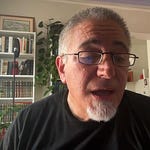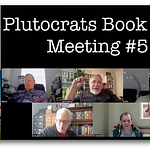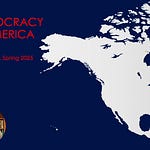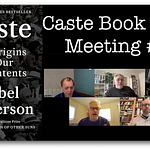D: Yeah. It's got that flavor of, "what then must we do?" But at a very personal kind of level. I think that strangely, that is probably a really good mix with Substack because, Substack does seem to be about individuals trying to figure out how to... a lot of it up till now, at least the stuff that I'm seeing, has been how to become more precious as a writer but yeah,
T: There's a lot of that.
D: There's a lot of that. And a lot of it's good advice, but not necessarily the stuff that I'm most interested in pursuing. But yeah, that idea about individuals taking human steps that regular humans can take, really I think resonates with the medium itself. And also, I don't know, maybe just with my interest in going back to watching the farmers pick the rocks out of the field and bang on the hot metal and raise a few chickens.
T: But also, interestingly, thinking of kind of A3, A4, it was those very farmers picking the rocks out of the field and whether they're commercialized or not, and raising their cattle and their chickens and whatever, slightly more than subsistence farmers. That whole colonial experience generates the American Revolution and the origins of democracy as we know it and political ideas and,
D: and a hundred years further on generates the People's Party and the Farmer's Alliance. As they're becoming aware that, "Oh, holy shit, my lifestyle is in jeopardy because now there's a national and an international market that's facilitated by these railroads."
T: So there's an intertwining and I think on the kind of lay normal person level, it's not just about fixing your carbon footprint and eating less meat and worrying about fossil fuels and divesting your whatever. Yes, all of those things are really important. In fact, my daughter has a fantastic blog where she's her, this Libsusty is her taking you through all these issues that she herself is doing on a very practical, very concrete level, whereas, I'm coming in with the history and the philosophy and all this kind of head space stuff; but both, you need both, I think.
But I don't know, you have to do what you can do. And I'm not going to figure out renewable energy. I'm not going to figure out composting. Maybe with the farming background, you could do more. I'm a black thumb. I'm not a green thumb. My tomatoes are out there dying. I don't know what to do about them. But you're right. I think Substack is a place where there's people and a freedom and diversity of perspectives and an openness in the way people are writing and thinking and sharing and yes, there's some precious writing, but there's also a lot of kind of stuff that's just shooting from the heart and people putting their dilemmas out there and for the most part being mutually supportive and
D: yeah it does seem like it has been. Yeah. It's ironic that the farmers are really... Heather's famous blog on Substack, Letters from an American is after Crevecouer's Letters from an American Farmer, and I think that's the one thing that she is missing. And Crevecouer wasn't really an American farmer, Crevecouer was a French aristocrat, but…
T: Right. I just learned about him a couple of weeks ago with Alan Gelso's course on Wondrium his great course on the founders. And he has a whole episode on Crevecouer and it's like the Europeans getting caught in the American thing. It's really interesting.
D: And there are so many great primary sources of Europeans coming to America being just so curious about what the hell is going on.
T: What are they doing over there?
D: Doing and why is it so resonant? Yeah.
T: So what are you thinking? What are your next steps? You mentioned, you've now recombined your lifelong learners and making history. And I did that. I very briefly separated a separate Substack and then brought them back together. It's just too hard to keep up with more than one.
D: I think it was very hard. It was hard to divide my time.
T: But you have a lot more content than I do and you have different. Types of content and really radically different subject areas. I guess they're not really that different, but
D: That's going to be the challenge, is can I pull them together and can I show that my interest... I just did four posts on moving here in the last week or so. And that sort of self sufficient hobby farming thing, I think, comes from that interest in some of the topics that went into my environmental history textbook about family farming versus commercial industrial agriculture and agribusiness.
So hopefully I'll be able to pull those threads together and show that, what I'm talking about I think has a philosophical undertone or overtone or context that, maybe I'll try to talk about and hope that people see how these things, fit together. One of the things that I am hoping and one of my hopes for monetization actually is that people will start to see the connectedness and follow the connections.
I'm trying to make Substack more like Obsidian in the linking, right? Because I think that, what I have committed myself to do is make all of my posts free for a month. And then make all commenting free always. But beyond the month, once things go into the archives, I want people to continue to look for them. And then at some point that's going to require some type of membership, so that's my transition to trying to do this for a living. But also I think that there are interesting connections that are valuable. The other next thing I'm doing for a few hours every day right now is I'm basically rebuilding my courses for the fall for this new college, but also simultaneously to turn around and offer them to the world in some type of format.
T: Yeah, I think it needs to be out there. And one of the reasons why I think I'm not sure Substack is a good platform for offering courses. But on the other hand, it depends on how you view working through knowledge, especially as an adult learner. One idea is like you said, connecting the ideas of obsidian, being able to explore.
And I think you mentioned Chris Aldrich's vault or maybe it's his Hypothesis. That you can dig through all this stuff and you just follow all these learning paths. And you have choice, right? Whereas a course is going to be a very guided, sequential. It's got a syllabus, it's going to take you through in a systematic way.
And so depending on how you envision the learning process, particularly for adults or whoever your kind of target audience is, whoever your learners are, how is what paths are they going to need to take and what ultimately is your kind of learning objective? Are they just amassing ideas and information, or are they getting a framework that they can take with them to then go apply to their own continued learning? So these kinds of questions, I think platform matters in the way in the sequence you present information and connect it together. For whom you're envisioning to be your learner. Like those are the really hard but really worthwhile decisions.
D: And I think that there's a parallel for me in my mind with, and this will be our previews of coming attractions: next time we'll talk about PKM, right?
Because I think there's a parallel to this idea of the atomicity of thoughts versus notes taken from elsewhere and then turned into something and then being output as a part of a narrative or an argument in a longer form. I'm actually…right now what I'm doing for a couple hours each morning right now is I'm taking my textbook apart and making it a series of pages, a series of notes that are going to be related to each other. But yeah, I'm playing with this idea of information versus theme, so in building the courses, there I've mostly -- what I'm talking about is like survey courses.
So for people who are at a level where they want to or the system wants or expects them to learn some facts of American history, for example what the names and dates were and the major events and things like that. Which I'm good with, I think that is a prerequisite to thinking critically about These things, you got to know when they happened and at least what people think were the causal relationships. And then from there with a shared vocabulary, you can go to the next step, but I do want to as I've been thinking about this, I've been I've got 15 semesters. I'm teaching U. S. 2, so there are 15 decades, really, between Reconstruction and the present.
So at first I was thinking I want to talk about questions. I want to talk about, what is progressivism and what is it's
T: I need to take your course. I need to brush up on my basic facts before I get off on my,
D: I think that would be fun. And you could poke holes in it too. But questions like that, like where did populism come from? What is democracy? What is this tension between, centralization and states rights or individual rights or freedom and security and just all these things that we struggle with.
T: Yeah. There's so many big issues. This is, I think the one thing I feel compelled by this, I keep talking about the Hillsdale people, but these are basically this group of scholars coming out of Claremont that are criticizing what they see as the contemporary end result of this progressive movement beginning, after the Civil War, after Reconstruction. With the kind of rise of the industrialization and robber barons and immigration and all this thing happening. And so they're doing all this historical interpretation with a very contemporary, political agenda in view.
And at the same time, what they want to say is, "Oh, we need to get back to, constitutional principles. And what these guys really did wrong was wreck the constitution," right? Wilson and all this. And I'm just like, Really? So I'm thinking, okay, I just don't know this history well enough to intelligently criticize their take, they're,
D: I'm not a legal or a political historian, but I think somebody should write a takedown of the Supreme Court, just decision by decision over the years and just the mess that they made of America.
T: Have you seen retired Supreme Court Justice Stephen Breyers. He's got all these books out now. His newest one is on why I am a pragmatist and why I oppose originalism and textualism.
And he's taking on this kind of conservative idea. And you can compare him of course to Bork who didn't end up on the Supreme court, but clearly huge constitutional scholar or what's the other one? Scalia has a book out, and apparently Breyer and Scalia were actually good friends even though philosophically they were very opposed to... yeah, it's very interesting.
But then, you have new ideas coming out there which have not landed in actual people on the Supreme Court. But Adrian Vermeule, he's out of Harvard, he's got this whole new idea of common good constitutionalism. And he's teamed up with Cass Susstein, so Susstein and Adrian Vermeule have this common good constitution which I don't know if these kind of national conservatives become more politically influential, that's going to end up on the Supreme court or some candidate for it, it's going to be out there.
And this is a whole new idea. As far as I can tell. They're saying they're not originalists. They're not textualists but nor are they progressive judges or, as Breyer calls himself, a pragmatist. Yeah, we need to watch the court because stuff's going on there. I don't know. I don't understand it, I know just enough to be dangerous. There's a storm brewing, it's been brewing for a while, but,
D: yeah, so that is going to be part of my project too is yeah.
T: I know, you're as bad as me, Dan. You've got like how many projects and interests and
D: But the thing about history that I think people miss that makes it different from sociology and anthropology. And as much as I love David Graeber and James Scott, these are things that I don't love about them is, that in those fields, theory is first. And then evidence is fit to the hypothesis to confirm or disconfirm it and not the way everybody does history, but the way I would like to do history, everything is up for grabs and we need to try to find out as closely as we can, what happened, and the sequence of events, and what people thought they were doing when they were doing it. But then whatever theories we come up with to explain that and especially to narrativize that over large spans of time are really tenuous and are much less true than the,
T: I agree with that, that, all of those theories are things we today are coming up with and retrospectively imposing to make sense of the past for our own use.
D: Yeah.
T: The question is, how bad are they in terms of the evidence? But also how useful are they really? Are they for the sake of something good being good humans in the Anthropocene, or are they dangerous ?
But at the same time, I think I would push back just enough to say that humans are going to do that. That's how we make sense of things. The question, the thing is, you have to realize that it's your construct. It's your idea, your philosophy.
D: Step back from it and yeah. Yes. I'm committed to this, I'm, but not so much.
T: I realize it's my construct and that was probably not how they thought in the 19th century.
D: Or the person who has a commitment to the other side of the argument is deplorable, right? Or is not worthy to be considered.
T: Their evidence may be better than yours if you're using history as part of your argument.
D: Yeah. And so it's weird. I posted something that was a screed against ,what's his name, Matt Ahret the other day. That,
T: Oh, your Canadian Patriot guy.
D: I didn't intend to really be as focused on him as it was, but the thing that strikes me about what they're doing. And there's a guy that works with him. I think his name is Gerald Therrien, who writes something called "On the Trail of the Treasonous". And he's got this really strange approach to early American revolutionary era history as well. And comes from this, I think, strange, Lyndon LaRouche inspired theory of history as this epic struggle between people that they think of as humanists who are Platonists in their minds.
The Platonists are the humanists and the bad guys and there are, and they are bad guys and it is about good guys and bad guys.
T: Yeah. As soon as we enter good guys, we're back to what is it? What is it? Zero.
D: Zero Effect. Yeah. Yeah,
T: zero effect. You can tell when you've entered the realm of ideology because there are very clear good guys and very clear bad guys. And that if nothing else should be, one of the, one of the warnings. Yeah,
D: yeah, I think so. That there are people who are so heroic that they can't be challenged, like Dumas Malone's Jefferson, or, there are villains who can't be
T: Redeemed.
D: Can't be redeemed. And they hate John Stuart Mill.
T: How can you hate him?
D: That's the thing. It's like, how do you even pick these teams?
T: What? Yeah. That too. It's going to be very interesting. Yeah.
D: Anyway, we should probably
T: We probably should sign off. This is great. I look forward to many more interesting rambling conversations. I learned so much from you. So that's great.
D: If we can continue this maybe, once a month or every couple of weeks as we actually start putting things out there and as our different approaches to this kind of develop too, because I'm really interested in seeing... it really threw me for a loop when you went off for a week though, I have to say that
T: This is intentional actually. So my publishing cadence is three weeks on one week off because I learned that I just have to have a break. I need time to read. I need time to think, I need time to reflect. And it doesn't mean I actually do very much during that week, apart from read and just thinking.
But then I can come back and write some more. And I found this works very well for me. So I feel bad for my readers if, they miss me. That's great.
D: I'm glad if it's working for you, I'm glad you're doing it. I was surprised because I wasn't prepared; so maybe warn us next time, like I'm going away now. Oh, you won't see me for,
T: What I'm trying to do actually so I'm restructuring, so I'm trying to actually plan ahead rather than wake up in the morning and saying, what do I write about today? This is bad. This is very stressful, especially when I feel like I have to publish and it needs to be at least sort of getting better than it was the beginning.
But I've in this kind of three week cadence. The first post is what I calling a meta post and introduction, like okay here's maybe what we're going to be about these three weeks I still don't have it planned out but, and then the end one, the Friday at the end is, I'm trying to do an index. And I want to use that not so much to sum up the previous three weeks, but to actually go back into earlier posts that maybe new readers haven't read or other things.
Cause all my stuff is pretty evergreen. I'm not writing news stories or tackling issues of the day or anything. And so people are going to be off for a week while here's a little index of some of Previous posts, maybe you missed or whatever.
D: That's going to be really useful. Once you get to thousands of people, then there are going to be thousands of people who haven't seen the stuff that you wrote when you had only a hundred. So
T: exactly. And it's a way for me also to go back and review my content and see what's there and organize things a little bit and find some connecting themes.
And I'm hoping that this kind of three week unit with then a week off, I do disappear. But I found it's very interesting this last time on my week off, I engaged a lot more on notes, right? And I was, I actually gave me time to read other people's Substacks and rather than spending most of my time just figuring, okay, what am I going to do?
And then writing and editing and like messing around with images and I don't know. There's a lot of the kind of daily publishing process that I just do not have down very well yet. But yeah, that's really working for me. And now it's not going to work for everyone. I think you're so prolific. I don't know how you publish all this stuff and this really quality stuff. I know you're drawing on old materials,
D: I am. Yeah. I'm in a little bit of a trough right now, but it's gonna evolve too. Yeah.
T: Anyway. Okay.
D: All right. Thanks very much, Tracy.
T: Thank you. This has been great. Until next time.
D: All right.
T: Okay. Bye.













Share this post